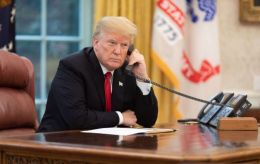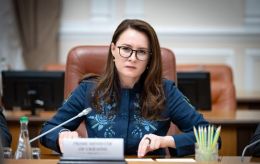Poland's election frontrunner: Who is Rafał Trzaskowski and what has he said about Ukraine?
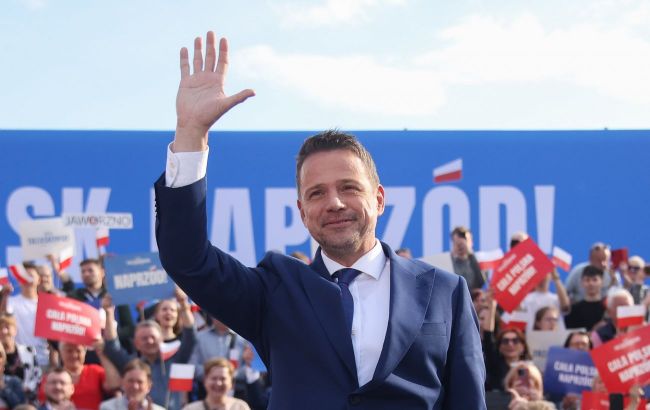 Photo: Polish presidential candidate Rafał Trzaskowski (Getty Images)
Photo: Polish presidential candidate Rafał Trzaskowski (Getty Images)
Rafał Trzaskowski is the mayor of Warsaw and the current frontrunner in the polls ahead of Poland’s presidential election, with the first round set for May 18. Trzaskowski is known for his pro-European stance and strong support for Ukraine, although a recent comment he made about the war has sparked controversy.
RBC-Ukraine outlines the key facts about Polish presidential candidate Rafał Trzaskowski in the report below.
Takeaways:
- Who is Rafał Trzaskowski?
- What is known about his political career?
- What are Trzaskowski’s poll numbers?
- What is his stance on the war in Ukraine?
Biography of Rafał Trzaskowski
Rafał Kazimierz Trzaskowski was born on January 17, 1972, in Warsaw into a creative family. His father, Andrzej Trzaskowski, was a jazz pianist and composer who worked with well-known Polish film directors. Thanks to his father, young Rafał even had a brief appearance in the children’s TV series Our Yard in 1980.
During his school years, Trzaskowski showed a strong talent for languages, becoming fluent in English. He also learned Russian, which was mandatory in Poland at the time, and later mastered French, Spanish, and Italian.
As a teenager, Trzaskowski sympathized with the pro-democracy movement Solidarity.
During the historic 1989 elections, which marked a turning point in Poland’s return to independence, 17-year-old Rafał volunteered at the Warsaw office of the Citizens’ Committee. He assisted as an interpreter for international observers. These connections opened the door for him to receive a scholarship for several months of study in the United States.
After returning to Poland, he enrolled at the University of Warsaw to study international relations while simultaneously attending the Faculty of Philology.
He also completed internships at the University of Oxford and at the European Union Institute for Security Studies in Paris.
Rafał Trzaskowski’s career
While still a university student, Rafał Trzaskowski began his career in 1995 as a simultaneous interpreter. He also taught English at a secondary school and, starting in 1998, at the National School of Public Administration.
In the early 2000s, he served as an adviser to Jacek Saryusz-Wolski, secretary of the parliamentary Committee for European Integration, and worked as an expert on international relations and European integration at the Natolin European Centre think tank.
Trzaskowski was actively involved in the pro-European Civic Platform party led by Donald Tusk.
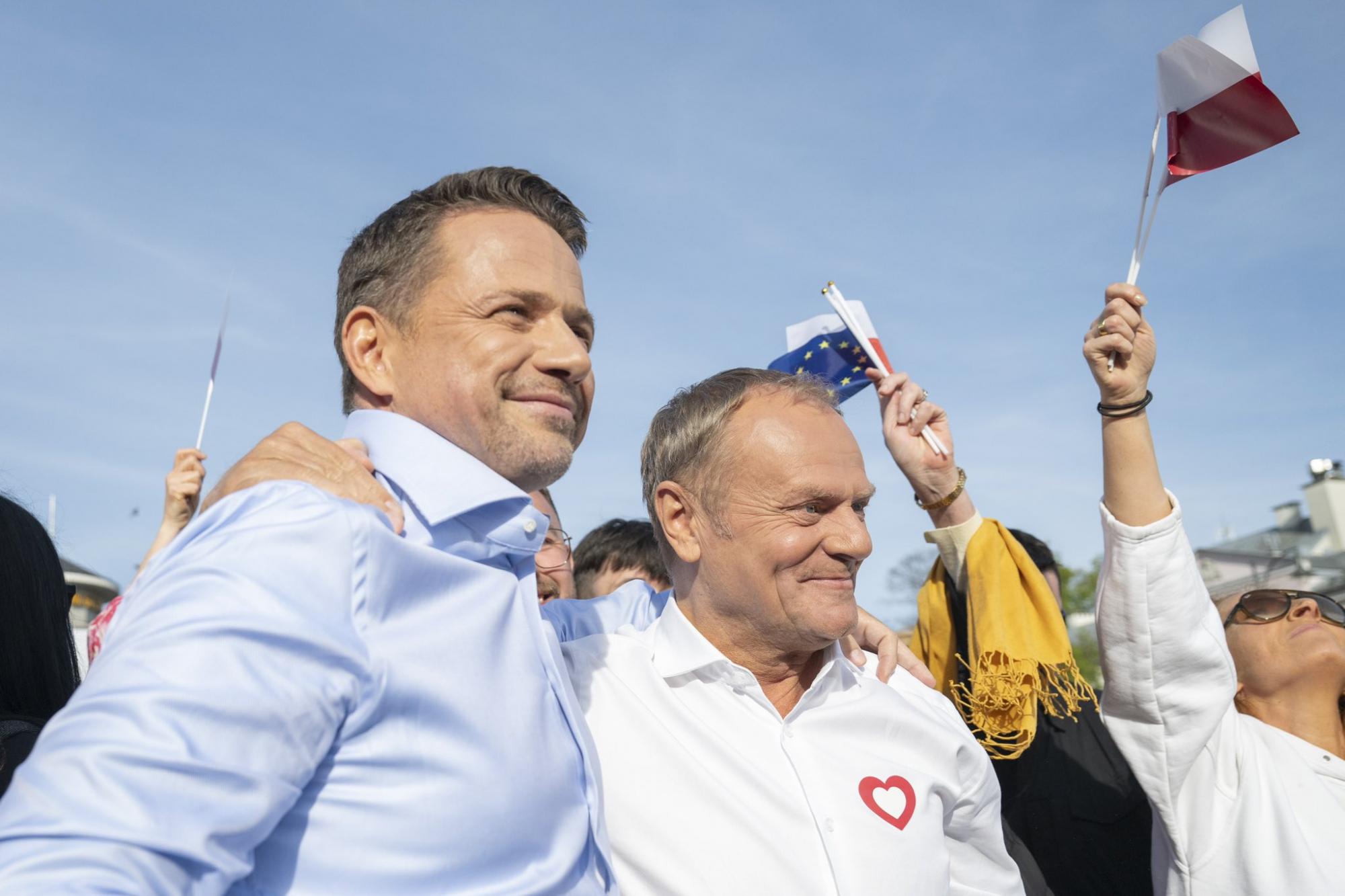
Photo: Rafał Trzaskowski and Polish Prime Minister Donald Tusk (x.com/trzaskowski)
From European Parliament to Warsaw mayor: Trzaskowski’s political journey
From 2004 to 2009, Rafał Trzaskowski served as an adviser to the Civic Platform delegation in the European Parliament. In 2009, he successfully ran for a seat as a Member of the European Parliament, representing the Warsaw constituency.
In the European Parliament, he joined the European People's Party (EPP) group, became vice-chair of the Committee on Constitutional Affairs, and worked on the Committee on the Internal Market and Consumer Protection.
In the autumn of 2013, Trzaskowski returned to Poland, giving up his seat in the European Parliament to take over the Ministry of Administration and Digitization in Donald Tusk’s government.
After Tusk became President of the European Council, Ewa Kopacz took office as Prime Minister. In her cabinet, Trzaskowski served as Secretary of State in the Ministry of Foreign Affairs, overseeing Poland’s European policy.
Following the 2015 parliamentary elections, which moved Civic Platform into opposition, Trzaskowski was elected to the Sejm and appointed shadow foreign minister. In 2017, with Donald Tusk’s backing, he was elected Vice President of the European People’s Party.
In 2018, Trzaskowski ran for mayor of Warsaw as a Civic Platform candidate and secured a decisive first-round victory with 56.67% of the vote.
As mayor, he earned a reputation as an effective administrator despite constant criticism from the ruling Law and Justice party. In 2024, he was re-elected with 57.4% of the vote.
Running for president
In February 2020, Rafał Trzaskowski was elected vice-president of Civic Platform and became the opposition’s presidential candidate.
Running under the slogan "Strong president, united Poland," he advanced to the runoff but narrowly lost to incumbent Andrzej Duda with 48.97% of the vote.
In November 2024, Trzaskowski won the Civic Coalition’s primary with 74.75% of the vote, becoming the alliance’s official candidate in the 2025 presidential election.
In his campaign, Trzaskowski has called for strengthening Poland’s defense capabilities and raising defense spending to 5% of GDP by 2026. He also advocates for deeper European integration and has expressed support for potentially adopting the euro.
The Civic Coalition candidate has backed legislation to allow abortions up to a certain stage of pregnancy and to guarantee access to emergency contraception.
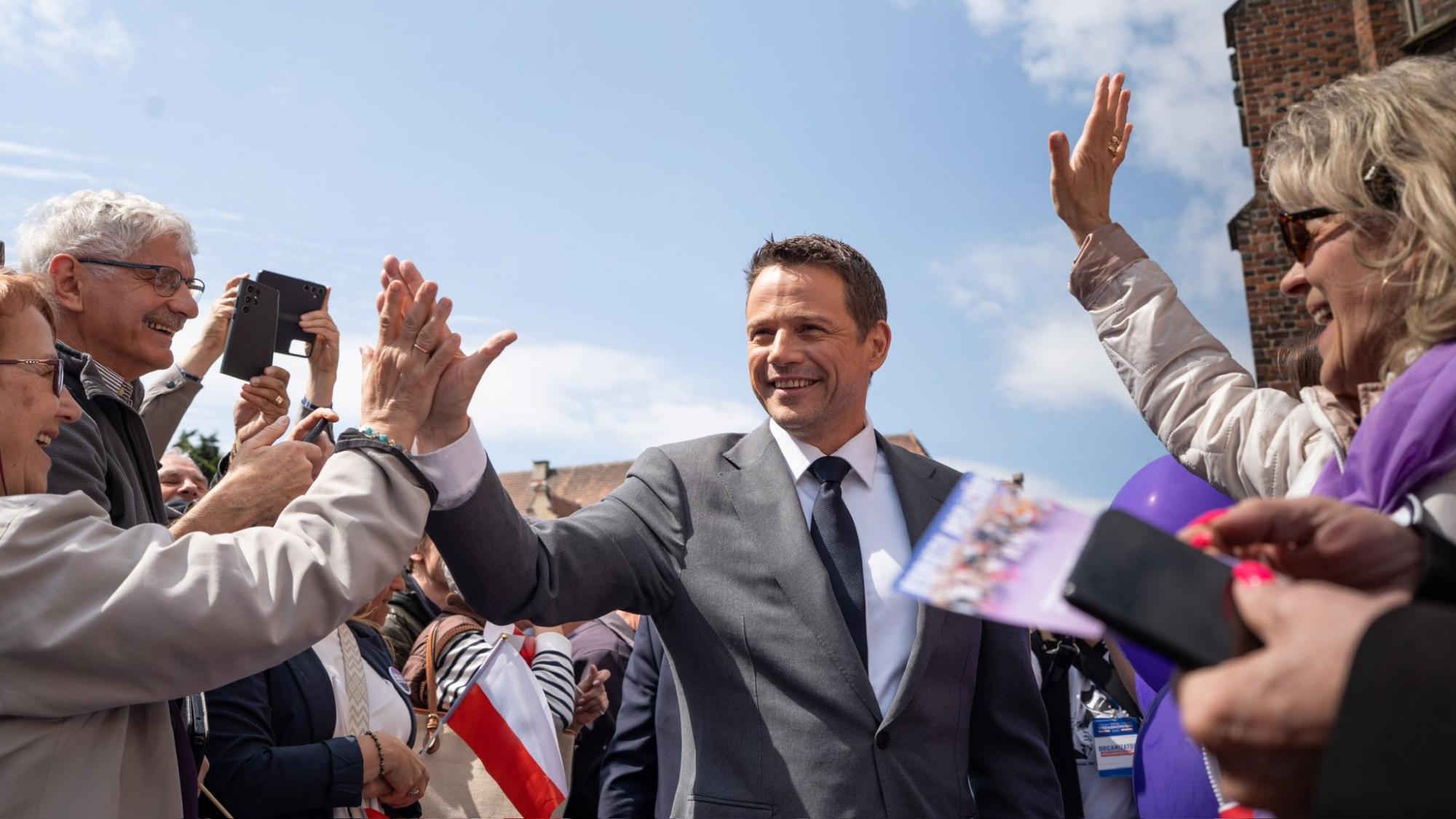
Photo: Rafał Trzaskowski – leader of the ratings before the elections (x.com/trzaskowski)
According to recent polls, Rafał Trzaskowski is one of the front-runners in the 2025 presidential race.
In the latest survey conducted by the Institute for Market and Social Research (IBRiS), Trzaskowski received 33.7% of voter support. Karol Nawrocki, the candidate from the ruling Law and Justice party, came in second with 21.6%, while Sławomir Mentzen of the Confederation party ranked third with 11.8%.
Moreover, 55.6% of respondents said they would vote for Trzaskowski in a second-round runoff.
Position on Ukraine and controversy over 'buffer zone' comment
Trzaskowski has consistently supported Ukraine, its sovereignty, and its aspirations for European integration. He has repeatedly emphasized that Ukraine’s accession to NATO and the EU is vital to Poland’s and the region’s security.
"There is no doubt that Ukraine’s membership in NATO and the European Union serves Poland’s interests and strengthens our security," Trzaskowski has stated.
Since the beginning of Russia’s full-scale invasion, Trzaskowski has played an active role in organizing humanitarian aid for Ukrainian cities as mayor of Warsaw. Under his leadership, the city donated metro cars to Kyiv and provided aid to Kherson after the destruction of the Kakhovka dam.
However, during a presidential debate in May 2025, Trzaskowski made a statement that sparked controversy in both Ukraine and Poland. He suggested that Ukraine should serve as a “buffer zone” between Russia and the West.
"Since my time working in the EU and the European Parliament, I have clearly stated that Russia is a threat and that Ukraine should be a buffer zone," the candidate said.
The remark was made in the context of discussing threats from Moscow and Ukraine’s role in regional security.
Trzaskowski also added that both the EU and the US have a shared interest in ensuring that Russia does not win the war and that all parties seek a just peace.
He stressed the need to strengthen Poland’s defense, arguing that Russian President Vladimir Putin understands only the language of force.
"It is essential that Russian tanks are not five kilometers from Hrubieszów. Poland’s security must be the top priority," Trzaskowski said.
At the same time, he expressed caution about the idea of Poland’s direct military involvement in the war, stressing the importance of defending NATO’s eastern border.
"I don’t think sending Polish troops to Ukraine is a good idea, and it’s something that should be carefully considered. Above all, the war must come to an end — and I hope it ends in a way that benefits Ukraine. That’s the most important thing," he said.
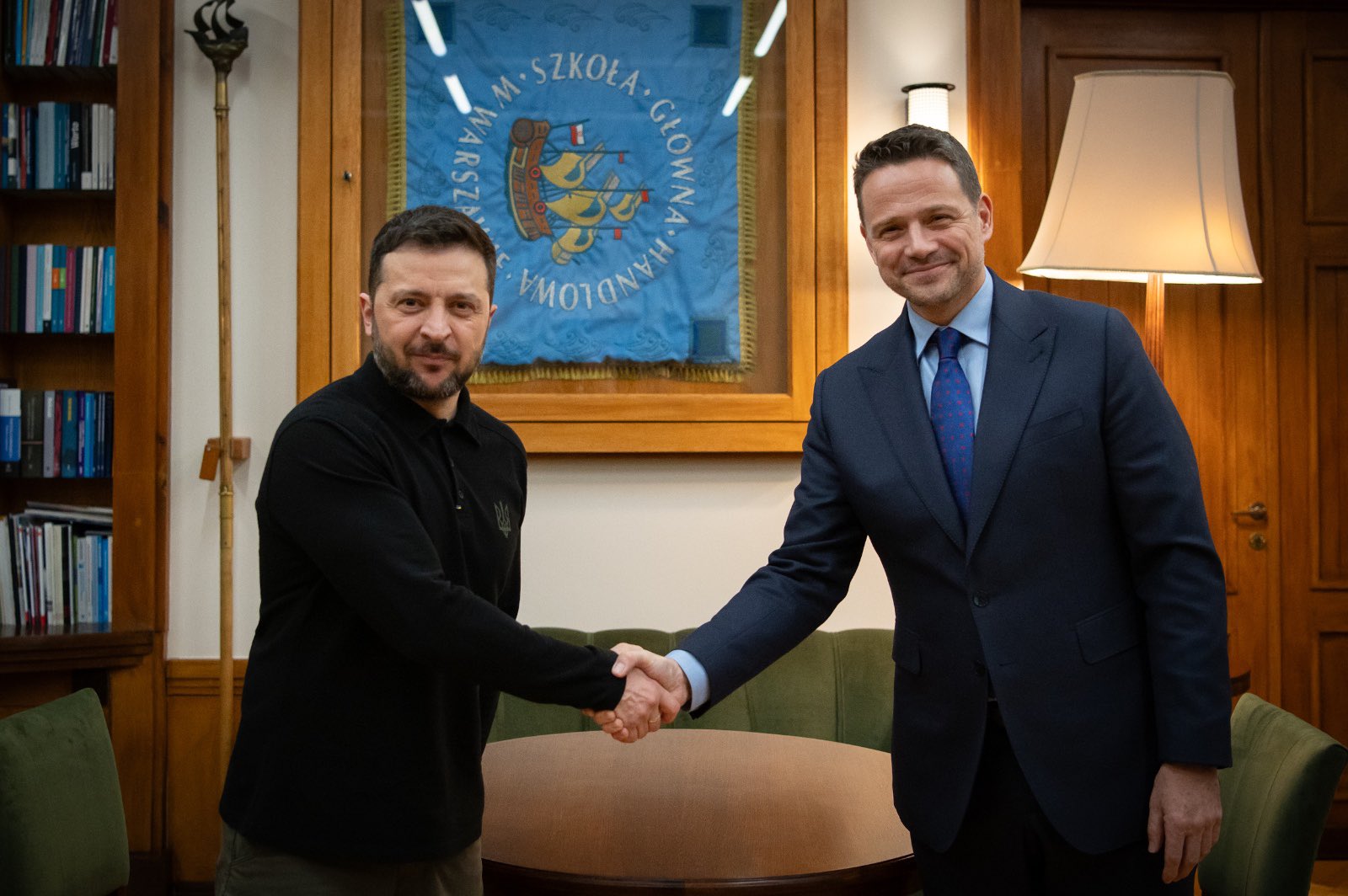
Photo: Rafał Trzaskowski met with Ukrainian President Volodymyr Zelenskyy in early 2025 (x.com/trzaskowski)
Rafał Trzaskowski also supports extending sanctions against Russia and believes that it is Russia that should compensate Ukraine and its allies for the costs of assistance.
"We must be consistent. It cannot be that Putin faces no consequences for this aggression," Trzaskowski said about sanctions pressure on the Russian Federation.
The presidential candidate’s position on supporting Ukrainian refugees is that aid should continue only for those Ukrainians who work, live, and pay taxes in Poland.
"For me, it is absolutely natural to decide that those who do not work and are not in Poland will not be entitled to these payments. We have granted our Ukrainian friends the same rights as our citizens in these matters," said the mayor of Warsaw.
Regarding bilateral relations between Ukraine and Poland in the context of historical events, Trzaskowski emphasized the importance of truth and mutual respect, particularly on difficult historical issues such as the Volyn tragedy. He noted progress in the matter of exhumation and burial of the victims of these events.
"It is good that the issue of exhumation and burial of the victims of this genocide is finally gradually moving out of a deadlock," Rafał Trzaskowski said during a meeting with Ukrainian President Volodymyr Zelenskyy in January 2025.
Presidential election in Poland
The presidential election in Poland is scheduled for Sunday, 18 May 2025. If no candidate receives more than 50% of the vote in the first round, the second round may take place on 1 June. The newly elected president of Poland will take the oath of office on 6 August 2025.
The current head of state, Andrzej Duda, is not eligible to run for a third term, as the law allows no more than two terms in office.
Among the main contenders for the presidency, in addition to Warsaw Mayor Rafał Trzaskowski, are Karol Nawrocki from the Law and Justice party and Sławomir Mentzen, a representative of the far-right political force Confederation.
Sources: materials by Wiadomości, PAP, RFI, information from Wikipedia, and Rafał Trzaskowski’s social media page on X.
